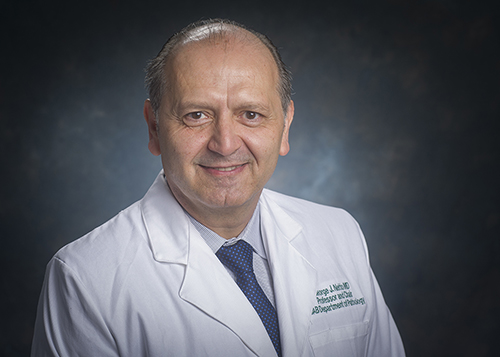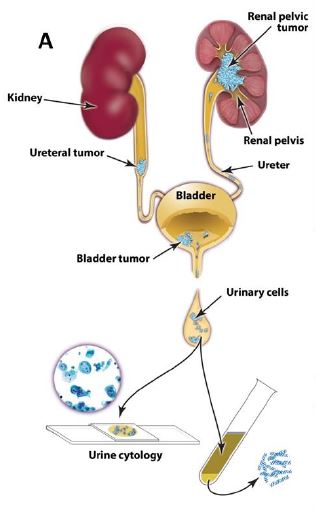
 George Netto, M.D., an internationally recognized clinician-scientist and the chair of the UAB Department of Pathology, is the third winner of the UAB School of Medicine’s Featured Discovery for his study titled “Non-invasive detection of urothelial cancer through the analysis of driver gene mutation and aneuploidy.” This initiative celebrates the important research from UAB School of Medicine faculty members. Dr. Netto conducted research that found a new test for urothelial cancers, which is less invasive and more accurate. Read more from UAB News here.
George Netto, M.D., an internationally recognized clinician-scientist and the chair of the UAB Department of Pathology, is the third winner of the UAB School of Medicine’s Featured Discovery for his study titled “Non-invasive detection of urothelial cancer through the analysis of driver gene mutation and aneuploidy.” This initiative celebrates the important research from UAB School of Medicine faculty members. Dr. Netto conducted research that found a new test for urothelial cancers, which is less invasive and more accurate. Read more from UAB News here.
The School of Medicine communications staff sat down with Dr. Netto to get his insights about his research, UAB and the science community.
Q: What compelled you to pursue this research?
A: This research was driven by the ongoing need, despite previous attempts, to develop an accurate, noninvasive procedure that will help diagnose patients suspected of having bladder cancer. The test will also be used to follow up on those who already have bladder cancer and need to be monitored for recurrence. The emphasis is on improved patient care because patients with bladder cancer can endure many cystoscopies (an endoscopy of the urinary bladder via the urethra), which are invasive in addition to being costly.

A: Studies like this that focus on early detection and molecular-based assays involving blood and urine will further the trend toward liquid biopsies. This is where easily obtainable blood and urine samples are the source of assessments for tumors and other anomalies. This research will impact the attention given to urine as another source for the molecular analysis of tumors.
Q: What is your research’s relevance to human disease?
A: Once they become available to patients, such tests can offer an accurate and noninvasive way to identify patients with bladder cancer. They can also assure patients who are at risk for bladder cancer that they do not have it without the need to undergo many procedures.
Q: When did you know you had an important discovery?
A: The first phase of this research involved our research team identifying a mutation in telomorase reverse transcriptase (TERT) as the most prevalent genetic alteration in urothelial carcinoma. We knew the discovery was significant when we found that we could develop a urine-based assay identifying (TERT) promoter mutation as a way to identify bladder cancer.
Q: What made you come to UAB?
A: I was drawn to and impressed by the strength of the basic science here, as well as recent initiatives in translational and precision medicine. I knew UAB was a place where discoveries like this one would find strong support, being surrounded by collaborators and experts in their respective fields. Additional strong incentives include institution’s commitment to addressing health disparities and the opportunity to make an impact on our patient population.